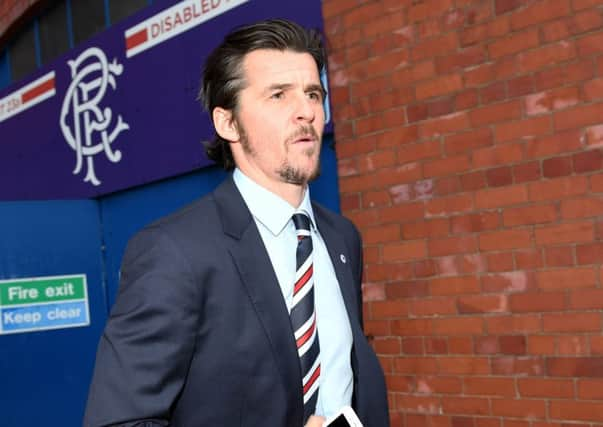Dani Garavelli: Football lost in moral maze over Barton


Like Al Capone, the offence that looks set to end Barton’s career is a comparatively minor one. Of the 1,260 illicit bets he placed, just 42 on 20 matches involved his own team, and only 15 were on his team to lose. Of those 20 matches, he played in just two, so, though what he did was wrong, there was no suggestion of match-fixing.
Barton’s assault on Dabo – for which he received a four-month suspended jail sentence – resulted in a 12-match ban (six suspended), Luis Suarez’s biting of Giorgio Chiellini’s ear, a four-month ban and Eric Cantona’s kung-fu kicking of a fan, a nine-month ban.
Advertisement
Hide AdAdvertisement
Hide AdBreaches of the betting rules are clearly unacceptable; inside knowledge places players at an unfair advantage, while the growth in spot betting provides more opportunities for corruption. In Barton’s case, however, it was only money (not life or limb or the integrity of the sport) at stake. Yet, even taking his gambling addiction into account, the FA ruled 18 months was the “shortest possible ban” it could countenance.
Coming in a week that Ched Evans looked set to be welcomed back by Sheffield United and the SFA was accused of being “asleep on the job” when it comes to protecting children from sex abuse, the disproportionate penalty meted out to Barton underlines the sport’s skewed values and its tendency to turn a blind eye to deep-rooted problems.
Its hypocrisy on gambling is flagrant. The FA has made a scapegoat of Barton while happily pocketing bookmakers’ money. Ladbrokes currently sponsors the England team and the Emirates FA cup in return for brand exposure and Wembley in-stadium betting rights. Last week, it emerged the company had also agreed a one-year extension on a deal with the Scottish Professional Football League (SPFL) that sees them back all four senior divisions. Nearly every English Premier League team relies on funding from bookmakers. Indeed, even as Barton was writing a statement in mitigation, his team, Burnley, were tweeting adverts for shirt sponsors Dafabet.
With football and betting companies locked in a symbiotic relationship, it’s hardly surprising a culture of gambling has developed. As Barton points out, players spend a lot of time travelling to and from games, and hanging around hotel rooms, with nothing to do but surf the sporting channels; placing bets on the games they watch is always going to be a temptation.
Last week, the chairman of the Professional Footballers’ Association Scotland, John Rankin, claimed the problem was rife, extending beyond players to managers, referees, directors and chairmen, and that previous bans had done nothing to stop it.
Making an example of Barton may act as a temporary deterrent, but the Scottish Football Supporters Association (SFSA) is right when it suggests that rather than merely punishing those individuals who get caught, the sport ought to review its own links with the gambling industry.
The same complacency over systemic problems seems to apply to the child sex abuse scandal. Having apparently failed to protect children from paedophile coaches in the past – or to thoroughly investigate all previous allegations – the footballing authorities are now compounding their mistakes by failing to ensure comprehensive and timeous vetting.
Last week, a Scottish Parliament Committee report expressed concerns about a backlog of checks on coaches and other officials working with young players and said the figures provided by the Scottish Youth Football Association (SYFA) on the backlog were inconsistent.
Advertisement
Hide AdAdvertisement
Hide AdIt found there was an imbalance of power between young players and their agents – who are currently not required to have background checks – and called for action to strengthen the Protecting Vulnerable Groups (PVG) scheme.
Though the SYFA is a separate organisation, the committee found the SFA to have ultimate responsibility for ensuring adequate safeguards were in place. So how did the SFA react? It passed the buck, saying: “For absolute clarity, as the Scottish Youth FA is the employing organisation for youth football in Scotland, the responsibility for PVG checks in youth football rests with the Scottish Youth FA.”
Later in its statement, it added: “The committee will surely recognise the importance of devolved responsibility, sitting as it does in the Scottish Parliament, and therefore understand better than most that the Scottish Youth FA has jurisdiction over youth football in Scotland.”
Although the SFA did insist it had issued a directive to its members, including the SYFA, to comply with all policies and procedures on matters of child protection and wellbeing, and that failure to do so by the set deadline would “be regarded as a breach of its regulations and result in a referral to the Compliance Officer for potential action by an independent judicial panel”, its tone was way too defensive for an organisation caught in the middle of a major scandal.
Despite its many travails – and I haven’t even mentioned last week’s tax raids on Newcastle and West Ham or the footage of ex-Sunderland player Adam Johnson making disgusting comments about the 15-year-old girl he was jailed for grooming – football doesn’t seem to have grasped that its reputation is in the gutter. Though the FA’s decision to charge David Moyes for threatening to slap a female reporter is to be welcomed, there is still too little introspection on the scale of its problems with gambling, child abuse and the culture of sexual entitlement that infects players like Johnson, Evans and David Goodwillie.
The SFSA hit the nail on the head when it suggested the SFA may need to “adjust its moral compass”. Only by acknowledging and addressing the rot at its core can football’s image be salvaged and any degree of self-respect restored.